Paddy Head was a jockey back in an era when women were transitioning out of traditional jobs and into male-dominated fields. But Canadian racetracks in the 1970s were still not a welcome place for a wide-eyed girl who only wanted to ride racehorses.
In fact, her racetrack of choice in Vancouver British Columbia refused to license female jocks, but the Canadian would not be denied.
After college and a failed attempt to make a go of job in a hunter/jumper barn, Head did get her jockey’s license, and landed at Suffolk Downs in Boston to work at her dream job. From 1974 to 1979, Head and a tight-knit colony of female jocks, battled for the finish line against some fierce competition.
Those glory days stayed with Head and so did her love of Thoroughbreds. After hanging up her silks, she continued to work with the great athletes, re-training and re-homing them.
Now, 61 years old, Head has parlayed her life as a jockey and horseman into a new book titled Fixed.
In a Q&A with OffTrackThoroughbreds.com, Head discusses her truly unique life with horses, and now, writing.
Q: Paddy, you were a jockey at a time when lady jockeys were few and far between. How did this happen?
My decision to become a jockey was definitely emotional.
I was one of those girls who loved horses even though there were no horse people in my family. I had to make my own way into the equestrian world. In 1970, I was working at a hunter barn near Montreal when I read an article about a woman jockey at Blue Bonnets Racetrack.
I made my way to the track that very night. As soon as I saw Joan O’Shea ride onto the track, I knew I wanted to be a jockey.
Thank goodness I didn’t know how tough that would be. Trainers weren’t used to the idea of women jockeys and very few of them would put a woman on a horse, in the morning or the evening.
The horses that were offered to me for morning exercise were the horses the boys didn’t want to ride. These horses turned out to be my greatest teachers. I learned how to sit quietly on a nervous horse, what made them relax and what encouraged them for more speed.
I learned to trust their intelligence and instinct. A horse can react to situations much faster than a human can. When a riderless horse galloped full out towards me on the track one morning, I loosened the reins and let the two horses figure out which way to move.
The loose horse went to the left, my horse to the right. My knees quivered like jelly right after, but I was safe and sound.
By the spring of ’73, there was only one obstacle in my way to obtaining my jockey’s license—the starting gate.
Whenever I told a trainer I hadn’t been in the gate, they refused permission to try. I returned to Blue Bonnets that year and decided I wouldn’t say a word about it, just take the first opportunity.
That came on the morning the stewards were going to watch me break from the gate and decide if I was ready to race.
The trainer who was willing to take my apprentice contract did not realize I had never been in the gate. He put me on a mare named Ninacount who was one of the fastest horses on the grounds.
This is where my trust in horses came through for me. Nina broke straight and fast and I was awarded a jockey’s license. Thanks to Nina, the starting gate became one of my favorite places.
Q: In the arc of your successful career, you rode some great horses. Who were your favorites, and why?
Bouncing Bessie, Tim B Quiet, Miss Lili Marlene, Pat And Turn—these are the horses from the ‘70’s that stand out for me.
Bessie was a big, black mare who was very responsive and brave. Bessie helped me get my message across to the boys when the riding was pretty rough.
Tim B Quiet gave me several amazing races at Narragansett Park.
He held the track record for 1 mile 70 yards. He was running for $1500 claiming when I won on him by 7 lengths—proving he was still a classy old boy.
Lili weighed about 800 pounds and was the gamest, most athletic horse I ever rode. In our first race together, we were shut off going into the turn.
She jumped over the offending horse’s hocks, went to the outside and won by a length.
Pat And Turn stands out because of how difficult he was to ride. I got my first disqualification and suspension on him. Whenever a horse came up beside him, he’d drop his shoulder and hit them.
I rode him in three races, had two wins and a third (this was my DQ). A few months after the horse was claimed I discovered the reason for his behavior—he had originally been trained as a polo pony.
Q: Tell me about a horse called The Heckler.
I thank Denise Boudrot for inadvertently introducing me to The Heckler.
Denise would give me her second calls whenever she could. One day, I rode a horse named Any Old Tear for her. When I came out to the saddling paddock, the little mare had her eyes closed and was taking a nap. The trainer was so embarrassed by her he promised to put me on his best horse, The Heckler.
When I went to his barn the next morning, I was mortified to see that the big, good- looking gelding had a bow that would make Robin Hood proud. He was 7-years-old and had bowed the tendon when he was 4.
Knowing that he’d been sound for years, I had enough confidence to get on and gallop him. It was the beginning of a new life for me. My Canadian contract holder went out of business and Bobby Venezia, The Heckler’s owner, took my contract.
The Heckler and I were together for 45 races and only missed a check only twice.
That amazing horse taught me more about race riding than any other horse or human. He saved my life in a race one day. The horse in front of us broke down and came to a halt within a few strides. The Heckler would never pass a horse on the inside but there we were, on the rail, with no way out.
Heckler put his head in between the horse and the rail, nudged him aside with his shoulder and we scraped through. As if this was nothing out of the ordinary, he then picked up speed, continued the race and finished fifth.
I promised him on that day I would make sure he got a good home when his racing days were done. That came at age 11. I had him transported to a friend in Ontario and he became her riding horse.
Q: Suffolk Downs in Boston had several other women jockeys. What was it like riding with them?
Considering how few women jockeys there were in ’74, seven women riding at Suffolk Downs, was a phenomenal number.
All of us had different backgrounds and diverse personalities but we got along.
There were no fights in the women’s jocks room, though there were several in the men’s quarters. Denise Boudrot and I did all we could to make sure everyone got along. Our motives weren’t entirely altruistic.
Denise and I both needed a positive, calm atmosphere to be at our best out on the track.
Q: Why do you think the East Boston track was so welcoming to women?
Massachusetts has long been the site of revolution. The Boston Tea Party and the American Revolution began there. The state was also the seat of the abolitionist movement. It isn’t surprising then that Boston would stage the ‘women jockey revolution’.
For whatever reason Boston has been so open to women jockeys, I will remain forever grateful to the city for allowing me to achieve my dream and establish my career.
Q: Your life as a jockey has dovetailed into a recent work of fiction you’ve written, called Fixed. Please tell me about this book.
Fixed is the story of a woman jockey, Andy Crowley, struggling to make a career for herself in New England in the mid ‘70’s. Andy’s talent and determination catch the attention of not only the trainers, but of a few shady characters.
Some of my favorite horses, Miss Lili Marlene, Tim B Quiet and The Heckler, are Andy’s mounts. The horses and some of the real events will be further described on my website.
Q: The book title makes it sound like an ominous story, but it’s actually positive, right?
Very positive. The comments from readers, aged 14-86, have also been positive.
Both horse and non-horse people have told me how much they learned about racing and about a jockey’s life. The non-horse people were amazed by the diverse personalities of the horses.
The suspense kept them quickly turning the pages, but they slowed down to savor the scenes of Andy riding and the strategy of a race.
Many of the readers said they could feel the reins in their hands and the dirt hitting their face at forty miles an hour. The lightning reflexes of the jockeys and horses amazed them.
After reading Fixed, they had a new understanding of what it takes to be a jockey.
The novel has deepened the interest for some seasoned bettors and sparked curiosity in people who have never been to the track. I believe my novel will bring fans to the track, not scare them away.
Q: What are your future plans, with regards to writing, riding and re-homing?
I ride every day. I have several breeds, a Canadian mare that I do medieval games with, a quarter horse that I’m training and a yearling Azteca that I’m raising.
I advise people who are interested in ex-racehorses. I believe I can reach a larger audience through my books.
My way of educating is not through a ‘How To’ book but through an exciting and entertaining journey with Andy Crowley and her courageous Thoroughbred mounts.
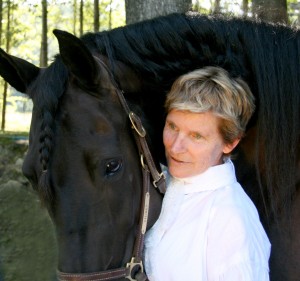
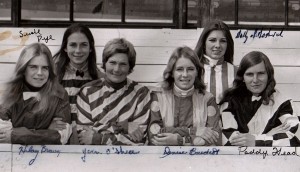
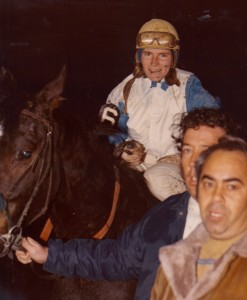
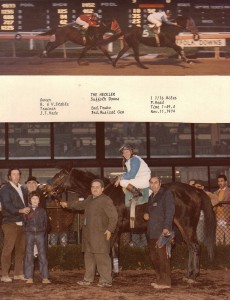
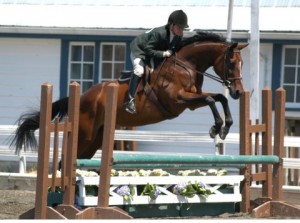
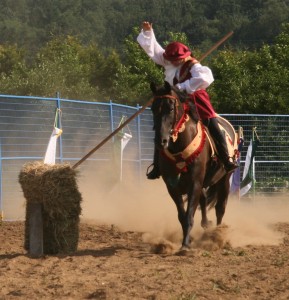

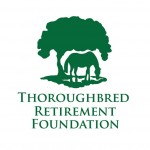
I owned Tim B Quiet in his twilight years and he is buried here on the farm. He was an amazing, kind horse that taught a teenager a lot in his second career.
Tim B Quiet belonged to my Grandfather Louis Procaccini, Green Pastures Farm
I remember reading about female jockeys hitting the racing scene and thinking how cool that could be. What an interesting interview. Now I have to read her book!
Lisa, I know what you mean. I keep studying the picture from the 70s, of Paddy with her compatriots, and I feel a pang. In another life, maybe it could have been me.
Thank you, Susan,for this wonderful opportunity to get my life’s story out to the world. I really appreciate the wonderful job you have done with this interview. I look forward to hearing from other women pioneer jockeys.
Paddy,
It was a pleasure. I wonder how many gifted writers make their living on the backside? Anyway, I loved it!